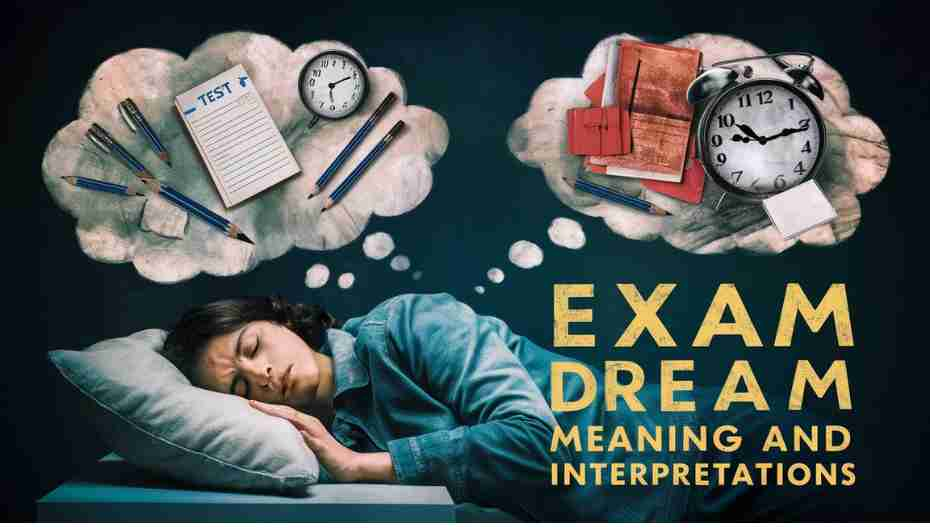Exam Dream Meaning and Interpretations

Exam dreams are a common experience for many people, often evoking feelings of anxiety, stress, and unpreparedness. These dreams can be unsettling, leaving the dreamer feeling overwhelmed and confused upon waking. However, by understanding the hidden meanings and interpretations behind exam dreams, individuals can gain valuable insights into their subconscious minds and use this knowledge for personal growth and development.
| Key Takeaway | Explanation |
|---|---|
| Exam dreams reflect waking life stressors | Exam dreams often symbolize feelings of being unprepared, judged, or scrutinized in real life situations |
| Dream scenarios offer insight | Specific details like the exam subject, setting, and actions provide clues to the dreamer’s subconscious concerns |
| Emotions in the dream are significant | The intensity of emotions experienced during an exam dream indicates the importance of the underlying issues |
| Recurring exam dreams suggest unresolved issues | Frequently experiencing exam dreams may signify a need to address ongoing stressors or anxieties |
| Exam dreams are opportunities for growth | Analyzing exam dreams can lead to greater self-awareness and personal development |
What are Exam Dreams?
Exam dreams are a type of dream in which the dreamer finds themselves in a situation related to taking an exam or test. These dreams are characterized by feelings of anxiety, stress, and unpreparedness, mirroring the emotions often experienced in real-life exam situations. Common themes and scenarios in exam dreams include:
- Arriving late or missing the exam entirely
- Feeling unprepared or forgetting to study for the exam
- Taking an exam in an unfamiliar or bizarre subject
- Struggling with exam questions or running out of time
- Failing or receiving bad exam results in the dream
The connection between exam dreams and real-life stress, anxiety, or feelings of unpreparedness is well-established. Exam dreams often occur during periods of heightened stress, such as when an individual is facing a significant challenge or milestone in their personal or professional life. These dreams can serve as a reflection of the dreamer’s subconscious fears and concerns, providing valuable insights into their emotional state and psychological well-being.
Psychological Interpretations of Exam Dreams
Psychologists have long been fascinated by the meaning and significance of dreams, and exam dreams are no exception. Different psychological perspectives offer unique interpretations of exam dreams, each shedding light on the dreamer’s subconscious mind and emotional state.
Freudian Perspective
According to Sigmund Freud, dreams are a manifestation of the dreamer’s unconscious desires and fears. In the context of exam dreams, Freud might interpret the dream as a reflection of the dreamer’s unresolved conflicts or repressed desires related to their performance and success. For example, a dream about failing an exam could represent the dreamer’s fear of not meeting their own or others’ expectations, or a desire to rebel against authority figures.
Jungian Interpretation
Carl Jung, another influential figure in psychology, viewed dreams as a reflection of the dreamer’s shadow self and unresolved issues. According to Jung, the shadow self represents the aspects of the dreamer’s personality that they may not be aware of or may have rejected. In the case of exam dreams, Jung might interpret the dream as a call to confront and integrate these hidden aspects of the self, such as a fear of failure or a lack of confidence in one’s abilities.
Cognitive Perspective
The cognitive perspective in psychology focuses on the mental processes involved in thinking, learning, and memory. According to this perspective, exam dreams may reflect the dreamer’s cognitive processes related to their preparation and performance in exams. For example, a dream about forgetting to study for an exam could represent the dreamer’s anxiety about their ability to retain information and perform well on the test. Similarly, a dream about arriving late for an exam could indicate the dreamer’s concerns about time management and organization.
Memory Consolidation Theory
The memory consolidation theory suggests that dreams play a role in consolidating memories and enhancing learning. According to this theory, the brain processes and integrates new information during sleep, and dreams may reflect this process. In the context of exam dreams, the dreamer may be processing and consolidating information related to the exam, which could explain why they are dreaming about it.
Activation-Synthesis Theory
The activation-synthesis theory proposes that dreams are a result of the brain’s attempt to make sense of random neural activity during sleep. According to this theory, the brainstem generates random neural signals during REM sleep, which the cerebral cortex then tries to synthesize into coherent experiences, resulting in dreams. In the case of exam dreams, the random neural activity may be related to the stress and anxiety of the exam, which the brain then incorporates into the dream.
Threat Simulation Theory
The threat simulation theory suggests that dreams serve as a way for the brain to simulate potential threats and rehearse responses to them. According to this theory, dreams may help the dreamer prepare for potential challenges and threats in their waking life. In the context of exam dreams, the dreamer may be simulating the potential threat of failing the exam and rehearsing ways to overcome it.
Exam dreams can be interpreted through various psychological perspectives, each shedding light on the dreamer’s subconscious mind and emotional state. Understanding the meaning behind these dreams can help individuals better understand their thoughts, feelings, and behaviors related to exams and other stressful situations.
Common Exam Dream Scenarios and Their Meanings
Exam dreams can manifest in various scenarios, each with its own symbolic meaning. By understanding these scenarios and their interpretations, individuals can gain valuable insights into their subconscious fears, anxieties, and personal growth opportunities.
Arriving late or missing the exam entirely
Dreaming about arriving late or missing an exam entirely is a common scenario that often reflects the dreamer’s fear of missed opportunities, lack of preparedness, or self-sabotage tendencies in waking life. This dream may serve as a wake-up call to address procrastination habits and improve time management skills. To overcome these challenges, individuals can:
- Break down large tasks into smaller, manageable steps
- Set realistic deadlines and prioritize important tasks
- Use time-blocking techniques to allocate specific time slots for studying and other activities
- Develop a consistent routine to foster discipline and reduce the likelihood of last-minute cramming
Feeling unprepared or forgetting to study for the exam
Dreams about feeling unprepared or forgetting to study for an exam often stem from a lack of confidence, impostor syndrome, or fear of failure. These dreams may indicate that the individual is doubting their abilities or feeling overwhelmed by the demands of their waking life. To build self-confidence and create effective study plans, one can:
- Identify and challenge negative self-talk patterns
- Set achievable goals and celebrate small victories along the way
- Break down study material into manageable chunks and create a study schedule
- Seek support from peers, mentors, or tutors when needed
Taking an exam in an unfamiliar or bizarre subject
Dreaming about taking an exam in an unfamiliar or bizarre subject can symbolize the dreamer’s fear of facing new challenges, stepping out of their comfort zone, or exploring hidden talents. This dream scenario may encourage individuals to embrace change and cultivate a growth mindset in their personal and professional lives. To navigate these challenges, one can:
- Reframe uncertainty as an opportunity for growth and learning
- Develop resilience by focusing on the process rather than the outcome
- Seek out new experiences and challenges to expand their skill set and knowledge base
- Embrace a beginner’s mindset and be open to learning from failures and setbacks
Struggling with exam questions or running out of time
Dreams about struggling with exam questions or running out of time often reflect the dreamer’s feelings of being overwhelmed by life’s demands or doubting their abilities. These dreams may serve as a reminder to prioritize self-care, manage stress effectively, and seek support when needed. To cope with these challenges, individuals can:
- Practice mindfulness and relaxation techniques, such as deep breathing or meditation
- Break down complex problems into smaller, more manageable components
- Develop a support network of friends, family, or professionals to lean on during difficult times
- Prioritize self-care activities, such as exercise, healthy eating, and sufficient sleep
Failing or receiving bad exam results in the dream
Dreaming about failing an exam or receiving poor results often reflects the dreamer’s fear of disappointment, self-doubt, or negative self-perception. These dreams may stem from a lack of confidence in one’s abilities or a fear of not meeting expectations, whether they are personal expectations or those imposed by others.
To overcome these negative feelings and grow from the experience, it is important to:
- Reframe failure as an opportunity for growth and learning from mistakes
- Practice self-compassion and avoid harsh self-criticism
- Set realistic goals and celebrate progress, no matter how small
- Seek support from friends, family, or mentors when feeling overwhelmed or discouraged
Passing the exam or achieving success in the dream
On the other hand, dreams about passing an exam or achieving success often symbolize the dreamer’s confidence in their abilities, readiness to take on challenges, or a sense of accomplishment. These positive dreams can serve as a reminder to:
- Celebrate successes and acknowledge personal growth and progress
- Maintain a positive attitude and belief in oneself when facing new challenges
- Use the confidence gained from past successes to tackle future obstacles
- Share achievements with others and inspire them to pursue their own goals
| Exam Dream Scenario | Interpretation | Coping Strategies |
|---|---|---|
| Arriving late or missing the exam | Fear of missed opportunities, lack of preparedness, self-sabotage tendencies | Break down tasks, set realistic deadlines, develop a consistent routine |
| Feeling unprepared or forgetting to study | Lack of confidence, impostor syndrome, fear of failure | Challenge negative self-talk, set achievable goals, seek support |
| Taking an exam in an unfamiliar subject | Facing new challenges, stepping out of comfort zone, exploring hidden talents | Embrace change, develop resilience, seek new experiences |
| Struggling with exam questions or running out of time | Feeling overwhelmed by life’s demands, doubting abilities | Practice mindfulness, break down complex problems, prioritize self-care |
| Failing or receiving bad exam results | Fear of disappointment, self-doubt, negative self-perception | Reframe failure as growth opportunity, practice self-compassion, set realistic goals |
| Passing the exam or achieving success | Confidence in abilities, readiness for challenges, sense of accomplishment | Celebrate successes, maintain positive attitude, share achievements with others |
Liked what you read? Don’t miss our other dream meaning articles:
Symbolism and Metaphors in Exam Dreams
Exams in dreams often serve as a metaphor for life’s challenges, milestones, and personal growth. The dreamer’s performance in the exam can reflect their perception of how they are handling real-life situations and the emotions associated with those experiences.
Specific objects in exam dreams can also hold symbolic meaning:
- Pencils or pens may represent the tools and resources available to the dreamer to tackle challenges
- Erasers can symbolize the ability to correct mistakes or make changes in one’s life
- Calculators might indicate the need for careful planning and problem-solving skills
The exam setting itself can also be significant, with different locations representing various aspects of the dreamer’s life:
- Classrooms or lecture halls may symbolize familiar environments or comfort zones
- Unfamiliar locations can indicate new or uncharted territories in the dreamer’s life
Numbers, scores, and grading systems in exam dreams may reflect the dreamer’s self-evaluation or the way they perceive others’ judgments of their performance.
Coping Strategies for Exam Dream-Related Stress and Anxiety
To effectively manage the stress and anxiety triggered by exam dreams, it is essential to:
- Acknowledge and confront the underlying fears and anxieties, rather than avoiding them
- Practice relaxation techniques, such as deep breathing, meditation, or progressive muscle relaxation
- Engage in regular self-care activities, including exercise, healthy eating, and sufficient sleep
- Reframe negative self-talk and cultivate a positive, growth-oriented mindset
- Seek support from friends, family, or mental health professionals when feeling overwhelmed
Transforming Exam Dreams into Opportunities for Personal Growth
Exam dreams, whether positive or negative, can serve as valuable tools for self-reflection and personal growth. By examining the emotions, symbols, and experiences within these dreams, individuals can gain insights into their subconscious fears, desires, and motivations.
To transform exam dreams into opportunities for growth:
- Reflect on the lessons and insights gained from the dream experience
- Set realistic goals and create action plans to address areas of improvement or pursue new challenges
- Celebrate achievements, milestones, and the journey of continuous self-improvement
- Embrace challenges as opportunities for learning, growth, and self-discovery
By understanding the hidden meanings and interpretations behind exam dreams, individuals can harness the power of their subconscious mind to overcome obstacles, build self-confidence, and achieve personal and professional success. Exam dreams serve as a reminder that life’s challenges are opportunities for growth and that with perseverance, self-awareness, and a positive mindset, anyone can transform their dreams into reality.
FAQs
Are exam dreams more common among students or professionals?
Exam dreams are more prevalent among students, especially during periods of active exam preparation like midterms or finals. However, professionals in fields requiring ongoing certification or training may also experience exam dreams, reflecting the pressure to maintain competence and meet expectations.
Can exam dreams predict future academic or career success?
While exam dreams may reflect current anxiety or preparedness levels, there is no evidence that they can predict future academic or career outcomes. Some studies suggest that having exam dreams, even negative ones, is associated with slightly better actual exam performance compared to having no exam dreams.
How can I reduce the frequency and intensity of exam dreams?
To minimize exam dream distress:
- Maintain a realistic perspective and manage perfectionist tendencies
- Practice relaxation techniques like deep breathing or meditation
- Engage in self-care activities like exercise, healthy eating and adequate sleep
- Reframe negative self-talk and cultivate a growth mindset
- Seek support from friends, family or professionals if feeling overwhelmed
Lucid dreaming techniques may also potentially help gain control over exam dreams and reduce anxiety, though more research is needed.
Are there any gender differences in the prevalence or content of exam dreams?
Some gender differences in exam dreams have been observed. For example, one study found women dream more often of being the victim of aggression in exam dreams compared to men.] Women’s exam dreams may also contain more emotional and interpersonal content compared to men’s.
Can lucid dreaming techniques be used to control or overcome exam dreams?
Potentially, yes. Lucid dreaming, which involves recognizing you are dreaming and being able to control the dream, could be used to confront and change exam dream scenarios. More research is needed, but some suggest that practicing confronting fears within lucid exam dreams could reduce anxiety and enhance confidence. However, lucid dreaming takes practice to master and may not be for everyone.
Sources:
- Inception: The Exam Dream is Real – Penn State Law Review
- Examining the Relationship Between Lucid Dreaming and Creativity – University of Maine
- The Influence of Lucid Dreaming on Creativity – International Journal of Dream Research
- An exploration of the relationship between lucid dreaming and creativity in problem solving – University of Birmingham
- The sleep secret: how lucid dreams can make us fitter, more creative and less anxious – The Guardian
- Lucid Dreaming and Creativity: A Pilot Study – Journal of Creativity in Mental Health
- Understanding Your Dreams – Verywell Mind
- The Relationship Between Lucid Dreaming and Creativity – Pepperdine University
- How to Lucid Dream – Healthline
- What Do Americans Dream About? YouGov Poll – YouGov
- The Science Behind Dreaming – Scientific American
- A Supplement to Self-Organization Theory of Dreaming – Frontiers in Psychology
- Investigation on Neurobiological Mechanisms of Dreaming in the New Decade – National Center for Biotechnology Information
- The modulation of emotional memory consolidation by dream affect – Frontiers in Sleep, Behavior and Mental Health






